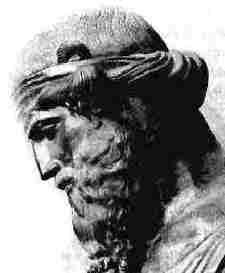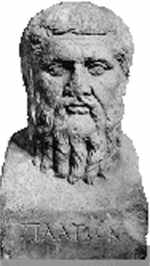Plato was a
student of Socrates. Most of what we know of Socrates
comes from Plato. Plato was very upset by his  teacher's
execution, and left Greece for more than a decade. He
returned to the village of Academia, near Athens, where
he began a school known as the Academy. Plato's Academy
operated for over nine hundred years.
teacher's
execution, and left Greece for more than a decade. He
returned to the village of Academia, near Athens, where
he began a school known as the Academy. Plato's Academy
operated for over nine hundred years.
Plato described what he
considered an ideal society in his most famous book, the
Republic. Plato did not believe in democracy. He argued
in favor of an aristocracy of merit, or rule by the best
and the wisest persons. A small guardian class would
select the best and the brightest students to join
them.
 Plato
believed the government should raise all children so that
everyone would have equal opportunities. Schools would
test students on a regular basis. Those who did poorly
would be sent to work, while those who did well would
continue their studies. At the age of thirty-five, those
persons who mastered their education would be sent to the
workplace to apply their learning to the real world.
After fifteen years, if the student was successful, he or
she would be admitted to the guardian class.
Plato
believed the government should raise all children so that
everyone would have equal opportunities. Schools would
test students on a regular basis. Those who did poorly
would be sent to work, while those who did well would
continue their studies. At the age of thirty-five, those
persons who mastered their education would be sent to the
workplace to apply their learning to the real world.
After fifteen years, if the student was successful, he or
she would be admitted to the guardian class.
Plato taught that the
ideals of truth or justice cannot exist in a material
world. Today we describe a "platonic" relationship as one
in which people have mental and spiritual exchanges but
refrain from physical intimacy.
 teacher's
execution, and left Greece for more than a decade. He
returned to the village of Academia, near Athens, where
he began a school known as the Academy. Plato's Academy
operated for over nine hundred years.
teacher's
execution, and left Greece for more than a decade. He
returned to the village of Academia, near Athens, where
he began a school known as the Academy. Plato's Academy
operated for over nine hundred years.
 Plato
believed the government should raise all children so that
everyone would have equal opportunities. Schools would
test students on a regular basis. Those who did poorly
would be sent to work, while those who did well would
continue their studies. At the age of thirty-five, those
persons who mastered their education would be sent to the
workplace to apply their learning to the real world.
After fifteen years, if the student was successful, he or
she would be admitted to the guardian class.
Plato
believed the government should raise all children so that
everyone would have equal opportunities. Schools would
test students on a regular basis. Those who did poorly
would be sent to work, while those who did well would
continue their studies. At the age of thirty-five, those
persons who mastered their education would be sent to the
workplace to apply their learning to the real world.
After fifteen years, if the student was successful, he or
she would be admitted to the guardian class.